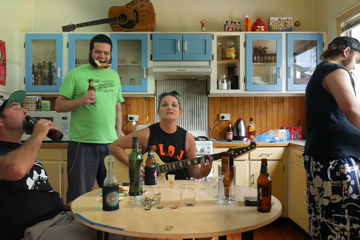
A group of people discuss a significant historical document - a diary by a man called Winston Smith. It is seen as a touchstone of an enlightened civilisation, written in a time when unyielding tyranny made such important thoughts a criminal act. In its pages, it reveals an illegal relationship with a fellow activist, Julia. It chronicles the importance of their small acts of intimate sedition and how their love emboldened them to challenge the authoritarian status quo. Some people in the discussion praise it as a remarkable manifesto. Others question its authenticity and provenance. Competing uncertainties begin to stir. Is the content of Winston's diary truly the miracle its held up to be? Could this be another vehicle of coercion? Did the Party really fall, or has the world merely been fooled into the belief that we have free will?
Of all the uncanny portents this narrative holds, there's one line in Robert Icke and Duncan Macmillan's stage adaptation of George Orwell's 1984 that has a particularly potent resonance: "It's always true, no matter when you read it." While this is in reference to Winston's diary, it's a meta-observation. There is indeed a striking perennial relevance in Orwell's dystopian vision of a world where terrified obedience, State sanctioned mind control and total surveillance has enslaved ordinary citizens. Whenever conservative politicians have threatened to erode the civil liberties at the heart of our democracy, the spectre of 1984 is easily summoned. But of course, as boorish, populist fearmongering has become an increasingly dominant presence in our current geopolitical climate, Orwellian anxieties have peaked to all-time highs.
But it's another moment in this show that holds the most chilling nod to our present reality. As Winston, the valiant, defiant hero of Orwell's prescient tale, is being tortured in Room 101, he cries out to the audience. He screams that he can see us. He desperately pleads with us and begs for our intervention. And as I suspect has happened in every performance since this production first premiered in 2014, the audience remains seated, unmoved, looking on as the horrifying spectacle continues.
There's a pointed statement knowingly made by Macmillan and Icke in this sudden break of the fourth wall, causing the audience to question their own place and complicity in political machines that could, very plausibly, lead us into a similarly iron-fisted regime. But it also suggests another fascinating (and deeply unsettling) point.
Don't miss a beat with our FREE daily newsletter
The battle between good and evil is as timeless a narrative genre as has ever existed. From children's fables to religious scripture, the triumph of hope, purity and righteous virtue over corruption and hate is in the very bedrock of human storytelling. And as people have shared these stories, over countless millennia in every human culture that has ever acquired the means to communicate such moral complexities, the perspective of the listener is invariably aligned with the noble hero.
But, as the often spoken cliche tells us, one man's freedom fighter is another man's terrorist. Orwell, inspired by the atrocities masterminded by Hitler and Stalin, imagined a scenario where outnumbered, scattered groups of dissidents, willing to fight, to rebel, to kill if necessary, attempt to overcome a governing power. The same theme is echoed in countless other stories, from Robin Hood to Star Wars, and in these examples, we root for the plucky, roguish underdogs, because we believe them to be morally superior. Macmillan and Icke hold a mirror up to an underlying hypocrisy in this perception, as Winston's vows to the anti-government Brotherhood are replayed. He promises to follow orders without question, to kill innocent people, to throw acid in the face of a child if so instructed, so long as it leads to the end of a regime he believes to be fundamentally corrupt. With the devastating images of recent terrorist attacks freshly seared into the memories of most of us, the parallels between Winston and religious extremists deals a brutal blow.
It's this level of extraordinary psychological, historical and cultural complexity that makes Icke and Macmillan's setting of Orwell such a superb accomplishment, although it's also a production that boasts some seriously well-heeled technical feats. The use of live captured video projection, and precisely orchestrated sound and lighting — a deliberately assaulting sensory overload, blasting the audience with deafening noise and blinding flashes — perfectly conditions the viewer to receive 1984's blistering semiotics. It's a work of extreme virtuosity, both in its theatrical articulation and its intellectual conceit.
Directed by Corey McMahon, this second season for Headlong Theatre's 1984, which had its Australian premiere to great fanfare at the 2015 Melbourne Festival, features an all-Australian cast, led by Tom Conroy as Winston and Ursula Mills as Julia, and this locally sourced talent certainly do this already highly lauded show proud. Conroy, in particular, demonstrates a gutting commitment to Winston's graphic destruction. It's profoundly confronting yet necessarily sobering; this is a production that refuses to let its audience off easy, and in our current global paradigm, where those who attack our democracy do so with absolute, unflinching moral certainty, such powerfully truthful theatre is more important than ever.
Headlong Theatre presents 1984 till 10 Jun at the Comedy Theatre, 14 — 18 at QPAC, Brisbane, 22 — 28 July at Roslyn Packer Theatre, Sydney, 25 — 29 July at Canberra Theatre Centre, and 4 — 13 August at His Majesty's Theatre, Perth.















